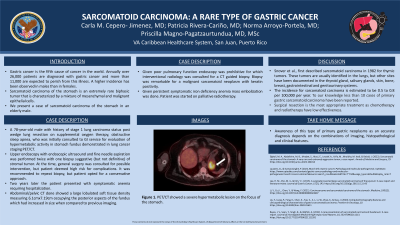Monday Poster Session
Category: Stomach
P2807 - Sarcomatoid Carcinoma: A Rare Type of Gastric Cancer
Monday, October 23, 2023
10:30 AM - 4:15 PM PT
Location: Exhibit Hall

Has Audio

Carla M. Cepero-Jimenez, MD
VA Caribbean Healthcare System
San Juan, PR
Presenting Author(s)
Carla M. Cepero-Jimenez, MD, Patricia J. Rivera-Cariño, MD, Norma Arroyo-Portela, MD, Priscilla Magno-Pagatzaurtundua, MD, MSc
VA Caribbean Healthcare System, San Juan, Puerto Rico
Introduction: Gastric cancer is the fifth cause of cancer in the world. Annually over 26,000 patients are diagnosed with gastric cancer and more than 11,000 are expected to perish from this illness. It has been observed a higher incidence in males than in females. Sarcomatoid carcinoma of the stomach is an extremely rare biphasic tumor that is characterized by a mixture of mesenchymal and malignant epithelial cells. We present a case of sarcomatoid carcinoma of the stomach in an elderly male.
Case Description/Methods: A 78-year-old male with history of stage 1 lung ca status post wedge lung resection on supplemental oxygen therapy, obstructive sleep apnea, who was initially consulted to GI service for evaluation of hypermetabolic activity in stomach fundus demonstrated in lung cancer staging PET/CT. Upper endoscopy with endoscopic ultrasound and fine needle aspiration was performed twice with one biopsy suggestive (but not definitive) of stromal tumor. At the time general surgery was consulted for possible intervention but patient deemed high risk for complications. It was recommended to repeat biopsy, but patient opted for a conservative approach. Two years later the patient presented with symptomatic anemia requiring hospitalization. Abdominal/pelvic CT done showed a large lobulated soft tissue density measuring 6.1cmx7.19cm occupying the posterior aspects of the fundus which had increased in size when compared to previous imaging. Given poor pulmonary function endoscopy was prohibitive for which interventional radiology was consulted for a CT guided biopsy. Biopsy was remarkable for a malignant sarcomatoid neoplasm with keratin positivity. Given persistent symptomatic iron deficiency anemia mass embolization was done. Patient was started on palliative radiotherapy.
Discussion: Snover et al., first described sarcomatoid carcinoma in 1982 for thymic tumors. These tumors are usually identified in the lungs, but other sites have been documented in the thyroid gland, salivary glands, skin, bone, breast, gastrointestinal and genitourinary systems. The incidence for sarcomatoid carcinoma is estimated to be 0.5 to 0.8 per 100,000 per year. To our knowledge less than 10 cases of primary gastric sarcomatoid carcinoma have been reported. Surgical resection is the most appropriate treatment as chemotherapy and radiotherapy have low effectiveness. Awareness of this type of primary gastric neoplasms as an accurate diagnosis depends on the combinations of imaging, histopathological and clinical features.
Disclosures:
Carla M. Cepero-Jimenez, MD, Patricia J. Rivera-Cariño, MD, Norma Arroyo-Portela, MD, Priscilla Magno-Pagatzaurtundua, MD, MSc. P2807 - Sarcomatoid Carcinoma: A Rare Type of Gastric Cancer, ACG 2023 Annual Scientific Meeting Abstracts. Vancouver, BC, Canada: American College of Gastroenterology.
VA Caribbean Healthcare System, San Juan, Puerto Rico
Introduction: Gastric cancer is the fifth cause of cancer in the world. Annually over 26,000 patients are diagnosed with gastric cancer and more than 11,000 are expected to perish from this illness. It has been observed a higher incidence in males than in females. Sarcomatoid carcinoma of the stomach is an extremely rare biphasic tumor that is characterized by a mixture of mesenchymal and malignant epithelial cells. We present a case of sarcomatoid carcinoma of the stomach in an elderly male.
Case Description/Methods: A 78-year-old male with history of stage 1 lung ca status post wedge lung resection on supplemental oxygen therapy, obstructive sleep apnea, who was initially consulted to GI service for evaluation of hypermetabolic activity in stomach fundus demonstrated in lung cancer staging PET/CT. Upper endoscopy with endoscopic ultrasound and fine needle aspiration was performed twice with one biopsy suggestive (but not definitive) of stromal tumor. At the time general surgery was consulted for possible intervention but patient deemed high risk for complications. It was recommended to repeat biopsy, but patient opted for a conservative approach. Two years later the patient presented with symptomatic anemia requiring hospitalization. Abdominal/pelvic CT done showed a large lobulated soft tissue density measuring 6.1cmx7.19cm occupying the posterior aspects of the fundus which had increased in size when compared to previous imaging. Given poor pulmonary function endoscopy was prohibitive for which interventional radiology was consulted for a CT guided biopsy. Biopsy was remarkable for a malignant sarcomatoid neoplasm with keratin positivity. Given persistent symptomatic iron deficiency anemia mass embolization was done. Patient was started on palliative radiotherapy.
Discussion: Snover et al., first described sarcomatoid carcinoma in 1982 for thymic tumors. These tumors are usually identified in the lungs, but other sites have been documented in the thyroid gland, salivary glands, skin, bone, breast, gastrointestinal and genitourinary systems. The incidence for sarcomatoid carcinoma is estimated to be 0.5 to 0.8 per 100,000 per year. To our knowledge less than 10 cases of primary gastric sarcomatoid carcinoma have been reported. Surgical resection is the most appropriate treatment as chemotherapy and radiotherapy have low effectiveness. Awareness of this type of primary gastric neoplasms as an accurate diagnosis depends on the combinations of imaging, histopathological and clinical features.
Disclosures:
Carla Cepero-Jimenez indicated no relevant financial relationships.
Patricia Rivera-Cariño indicated no relevant financial relationships.
Norma Arroyo-Portela indicated no relevant financial relationships.
Priscilla Magno-Pagatzaurtundua indicated no relevant financial relationships.
Carla M. Cepero-Jimenez, MD, Patricia J. Rivera-Cariño, MD, Norma Arroyo-Portela, MD, Priscilla Magno-Pagatzaurtundua, MD, MSc. P2807 - Sarcomatoid Carcinoma: A Rare Type of Gastric Cancer, ACG 2023 Annual Scientific Meeting Abstracts. Vancouver, BC, Canada: American College of Gastroenterology.
